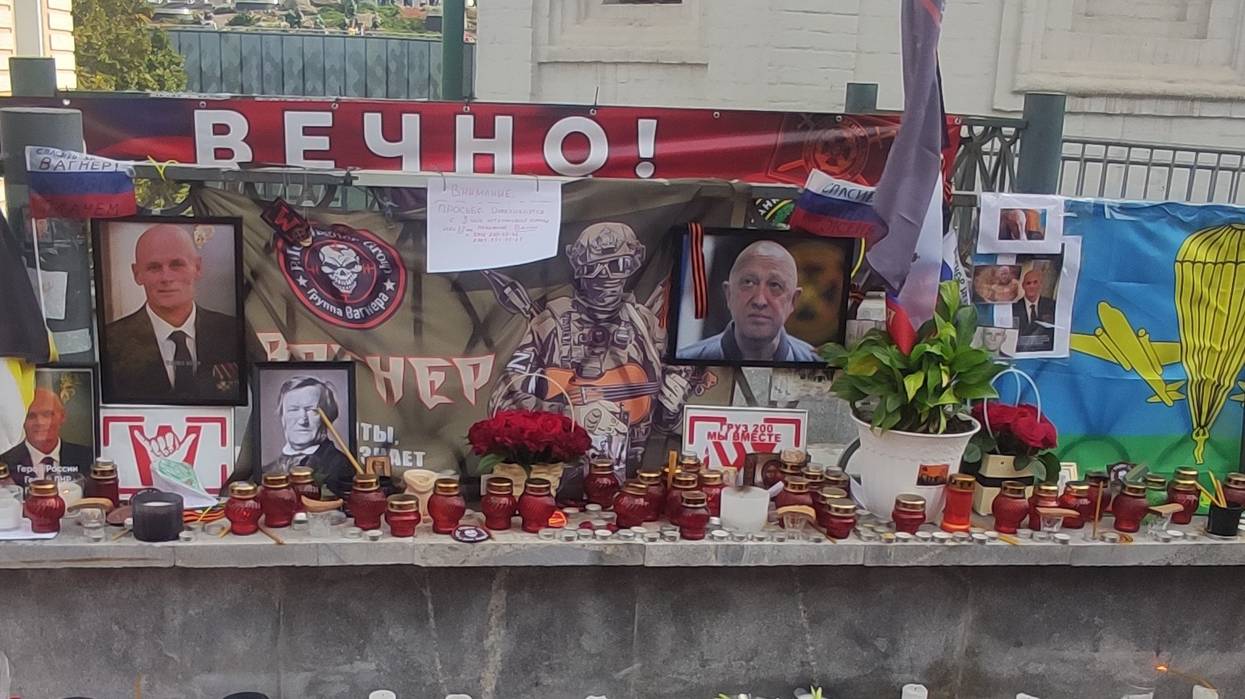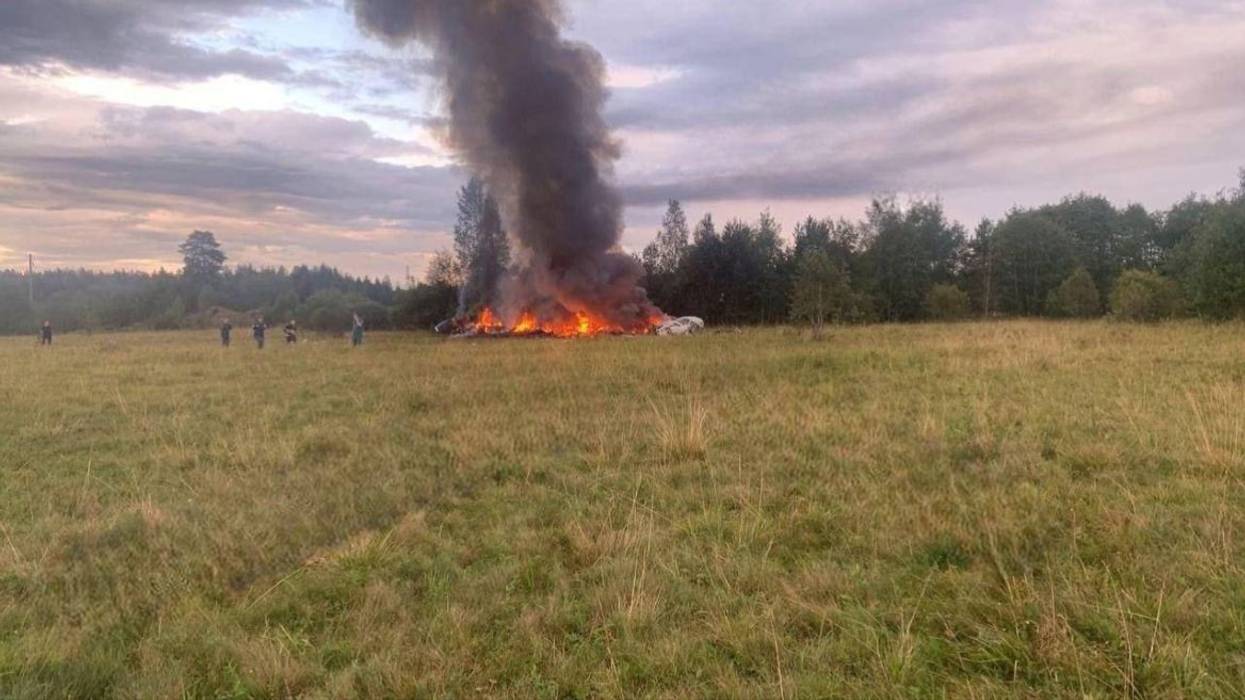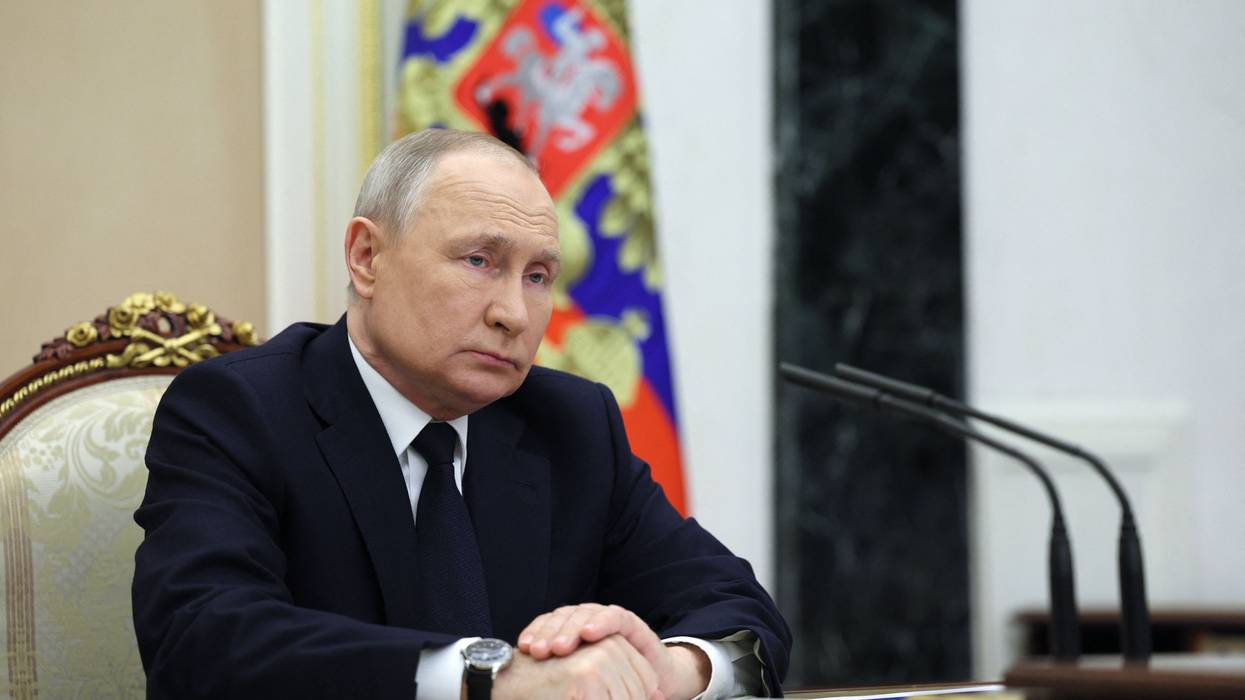The Russian Mercenary Who Displaced France’s Neocolonial Imperium in Africa
Yevgeny Prigozhin was one of those quixotic, improbable adventurers who, over the past two centuries, have served as the vanguards of new forms of empire.
One of modern history’s major empires is falling apart right now, right before our eyes. Yet precious few in the media have reported on this extraordinary event, much less offered any analysis of its implications for the fast-changing shape of global power.
Over the past 60 years, France has used every possible diplomatic device, overt and covert, fair and foul, to incorporate some 14 African nations into a neocolonial imperium called “Françafrique”—a vast region covering a quarter of Africa and stretching for nearly 3,000 miles from Senegal on the Atlantic coast to Chad in the continent’s center.
While the rest of that continent frequently suffered from wars, coups, and chronic instability, Françafrique long enjoyed comparative peace. By dispatching paratroopers from its many African bases (or secret agents for the occasional assassination), Paris provided a rough version of stability—even if at the price of endemic corruption, entrenched autocratic rule, and deep economic exploitation. Recently, however, a rising nationalist consciousness in many of those relatively new countries has begun chafing against that European land’s repeated transgressions of their sovereignty. As French colonial and postcolonial dominance over this vast region moved ever deeper into its second century, unease bordering on open hostility against that country’s presence began to build.
Should this process continue successfully into the near future, Moscow will have flanked Europe (and so the U.S. as well) by forming a geopolitical arc of influence sweeping south through the Middle East and extending west across the whole of the Sahel that stretches from the Red Sea to the Atlantic Ocean.
In less than a year, in fact, the sudden withdrawal of French troops from individual African nations has turned into a full-blown retreat from much of the region. As terrorists affiliated with ISIS first became active in 2014, France deployed some 5,000 elite troops for Operation Barkhane in collaboration with six nations of Africa’s arid Sahel region, the strip of territory extending across the continent, largely south of the Sahara Desert.
Yet just last December, French troops left the Central African Republic after Paris decided that the local government there was “complicit in an anti-French campaign allegedly steered by Russia.” In February, Burkino Faso’s new military government simply expelled French forces and hailed its new “strategic partnership” with Russia. And in August, following back-to-back coups in Mali, that country’s ruling junta grew resentful of the 2,400 French troops stationed there and forced them to withdraw into neighboring Niger, which became the new main base for their operations in the Sahel region. Then, last month, French President Emmanuel Macron was forced to announce that he was pulling his troops and his ambassador out of Niger as well. After seizing power in July, that country’s new military junta had demanded just such a French departure and, to drive the point home, closed its airspace to France. “Imperialist and neocolonialist forces are no longer welcome on our national territory,” the junta announced.
Amid such geopolitical upheaval, a most unlikely man from Moscow appeared on the spot in 2017. His name—now all too well known—was Yevgeny Prigozhin, founder and commander of a notorious mercenary army, the Wagner Group. As the French retreated slowly and exceedingly reluctantly from their postcolonial imperium, Wagner began moving in, becoming Moscow’s surrogate in an ongoing great-power contest for influence and control in Africa.
By the time in late 2022 that France’s failing nine-year effort to secure the Sahel was drawing down, Wagner’s forces were already operating secret gold mines in Sudan, running the largest gold mine in the Central African Republic with projected revenues of $100 million annually, and had earned $200 million since 2021 providing security for Mali, a land roiled by Islamist rebels. In March, Washington warned Chad’s president that Wagner mercenaries were plotting to assassinate him and were also preparing Chadian rebels to attack from their bases in the Central African Republic. After the July coup in Niger, cheering crowds were seen waving (as well as wearing) Russian flags. And as 1,500 French troops and that country’s ambassador were being withdrawn, Niger’s new military leaders promptly contacted Wagner for support, expanding Russia’s sphere of influence in the French imperium it was fast supplanting.
The strategic implications of this shift, should it continue, are potentially profound. As the NATO alliance moved ever closer to Russia’s sensitive western border in the 1990s, Moscow reacted early in this century (prior to the invasion of 2022) with repeated interventions in Ukraine, launched special operations to secure its allies in Central Asia, and, above all, engaged in a little understood geopolitical flanking maneuver across two continents.
The thrust of that move started in 2015 when Moscow leapfrogged over the NATO barrier of Turkey to open a massive air base at Latakia in northern Syria. Soon, Russian planes had reduced rebel-held cities like Aleppo to rubble. In 2021, leapfrogging again, this time over the close American ally Israel, Russia began supplying Egypt with two dozen of its advanced Sukhoi-35 jet fighters so its airmen could compete with Israelis flying advanced American F-35 fighter planes, which Washington refused to supply to Cairo. Completing Moscow’s southern push in the region, Russian President Vladimir Putin began building upon their shared interests as oil exporters to try to befriend Saudi Arabia’s functional leader, Prince Mohammed bin Salman, becoming so close by late last year that Western observers began to express concern about the possible loss of a key ally.
The final geopolitical pivot in Russia’s recent maneuvering proved particularly controversial and so initially remained significantly covert: The Wagner Group was used to extend Russia’s influence country by country, deal by dirty deal, across the Sahel. Should this process continue successfully into the near future, Moscow will have flanked Europe (and so the U.S. as well) by forming a geopolitical arc of influence sweeping south through the Middle East and extending west across the whole of the Sahel that stretches from the Red Sea to the Atlantic Ocean.
For this maneuver to succeed, however, the end of French neocolonialism proved crucial. To appreciate the historical significance of the impending fall of Paris’s postcolonial empire, it’s important to understand something of its tangled history—otherwise it would be hard to grasp the full import of Yevgeny Prigozhin’s extraordinary role as the man on the spot in extending Russia’s influence into Africa for the first time since the Cold War.
The Hidden History of Françafrique
As the bitter, bloody French colonial war in Algeria was winding down to defeat in 1960, President Charles de Gaulle realized that the age of empire was ending and used his enormous prestige to grant independence to 14 West African nations. Yet his move was far from altruistic. As part of his vision of France as an independent global power, he began working to create a postcolonial sphere of influence by subsuming the new nations into an exclusive French zone called Françafrique.
While de Gaulle’s visionary rhetoric inspired an independent foreign policy, his “man of the shadows,” presidential adviser Jacques Foccart, built a full-scale covert apparatus for a postcolonial imperium that became the dark underside of the grand Gaullist state. During his service under Gaullist governments from 1960 to 1997, the shadowy Foccart used the state’s clandestine agency, Service de Documentation Extérieure et de Contre-Espionnage, to maintain a deft, delicate synergy between metropolitan power in France and covert control of Francophone Africa. As head of de Gaulle’s political party and architect of its secret services, he would become the key link between the French executive and Françafrique’s African leaders, whom he personally selected, befriended, and defended with covert action.
At the moment of independence in 1960, Foccart bound all of those former colonies (except Guinea) to Paris by defense agreements that granted France military bases and the right of armed intervention in each country. In the process, he also developed treaties meant to secure strategic materials (cobalt, copper, oil, and uranium) from those countries, as well as a common currency pegged to the French franc that would ensure control of their economies.
With its lucrative oil concessions and its full integration into Foccart’s network, the exemplary state in Françafrique was undoubtedly Gabon.
Under this postcolonial iteration of informal empire, French troops shuttled in and out of West Africa, conducting more than 40 military interventions between 1960 and 2002, while maintaining a permanent presence at a half-dozen military bases on the continent. Although the rest of Africa suffered 188 coup attempts from 1956 to 2001, the readiness of the French military to quash any such effort provided Françafrique with what political scientist Crawford Young called an “effective inoculation against conspiracies” and so minimized and even controlled coups. Despite vivid personality cults, systemic corruption, and state terror, French complicity in all of the above assured its African allies of an extraordinary political longevity—exemplified by Omar Bongo who ruled Gabon for more than four decades.
With its lucrative oil concessions and its full integration into Foccart’s network, the exemplary state in Françafrique was undoubtedly Gabon—an unbearably poor country of 500,000 people that was surprisingly rich in natural resources. Three years after independence in 1960, as the country’s president lay dying of cancer in a Paris hospital, Foccart picked Omar Bongo, a veteran of French intelligence with no political base, as the ailing president’s running mate in the next election. That ticket then captured 99.5% of the vote, assuring that Bongo, though still just 31 years old, would succeed the president at his death six months later.
As Gabon’s political opposition revived in 1971, Foccart’s office dispatched the infamous mercenary Bob Denard as a “technical adviser” to President Bongo. Not surprisingly, when an influential opposition leader arrived home one night from the movies, an assassin stepped from the shadows and killed him, also wounding his wife and child. His body was never recovered.
During the long years of his rule, French officials enabled Bongo’s graft, making him a principal shareholder in that country’s lucrative Elf-Total oil company and facilitating illicit payments to him—estimated at $111 million a year—that were only exposed at the 2003 corruption trial of the company’s chief executive.
When he died in 2009 after a rule of 42 years, London’s Telegraph reported that he had looted revenues from the nation’s 2.5 billion barrel oil reserve to “become one of the world’s richest men,” while elevating “corruption to a method of government.” His son Ali-Ben Bongo succeeded him as president, inheriting, along with his siblings, 39 luxury properties in France worth $190 million and a country with a third of its population living on two dollars a day.
The son continued many of his father’s policies, including ruthlessly rigging the 2016 election by enforcing a 99% turnout in key districts. In August, however, after one too many rigged elections and amid an eruption of coups across the region that marked the fading of France’s postcolonial power, Ali Bongo was finally toppled by a military coup, ending a dynasty that had lasted nearly six decades.
Advent of Moscow’s Africa Man
To challenge that French postcolonial imperium built by cunning, corruption, and covert skullduggery, Moscow needed an operative who could match Jacques Foccart’s legendary mastery of the dirty business of empire, measure for measure. And it found him in the person of Yevgeny Prigozhin, one of those quixotic, improbable adventurers who, over the past two centuries, have served as the vanguards of new forms of empire.
Who was that extraordinary individual whose personal initiative shook up the world order in Africa, establishing a Russian mercenary troop presence and ties to governments in at least seven African countries? Emerging from Soviet prisons after a 10-year term for a teenage mugging spree, Prigozhin rose, through Vladimir Putin’s patronage, from a hot-dog vendor on the streets of St. Petersburg to a millionaire caterer for Russian schools and troops.
In 2014, his Wagner group of mercenaries first appeared as the shadowy “little green men” during the Russian seizure of Crimea and then moved on to Syria where they engaged in a war of atrocities. Between conflicts, his troll army fired off disinformation barrages meant to influence the 2016 presidential elections in the United States. As French influence in the Sahel was challenged by terrorist groups, Prigozhin inserted his Wagner mercenaries into the fissures being opened by the ending of Paris’ postcolonial empire and turned those cracks into gaping holes.
Despite the oft-cited role of military power in creating and maintaining them, individuals have often emerged from the covert realm to play surprisingly significant parts in the making of the postmodern version of empire.
When in 2022, as the first year of the Ukraine war was ending with Russian troops suffering demoralizing defeats at Kharkiv and Kherson, Prigozhin expanded his Wagner Syrian and African franchises to Ukraine, fielding some 50,000 convicts as troops for Putin’s military, a force that took heavy casualties while winning the battle for the devastated Ukrainian city of Bakhmut. Instead of celebrating his victory, Progozhin was growing ever more dissatisfied with Russia’s military chiefs.
“These are Wagner lads who died today,” he shouted on camera while pointing at a pile of corpses. “Those bastards who don’t give us ammunition, we will fucking eat their guts in fucking hell!” Within weeks his war of words had escalated into open conflict in Russia itself. In late June, Wagner’s troops were suddenly on the road to Moscow—smashing through barriers, shooting down Russian aircraft, and raising doubts about Vladimir Putin’s grip on power.
Flailing desperately to survive after defying Putin and halting the advance of his troops on Moscow, Prigozhin returned to Africa, landing in his private jet at Bangui, the capital of the Central African Republic where his Wagner Group has gold mines and a security contract. After a private meeting with that country’s president on August 18, he flew on to Mali and drove out into the desert where he produced what would turn out to be his last video ever. Holding an assault rifle, he proclaimed: “The Wagner PMC [private military company] makes Russia even greater on all continents, and Africa more free.” Five days later, his private jet crashed on a flight from Moscow, killing Prigozhin and everyone else on board.
Even though Prigozhin was undoubtedly assassinated (like so many of Putin’s critics), his extraordinary relationship with Africa highlights an overlooked aspect of modern empires in what still passes for the post-imperial age. Despite the oft-cited role of military power in creating and maintaining them, individuals have often emerged from the covert realm to play surprisingly significant parts in the making of the postmodern version of empire.
Instead of the gentlemen adventurers of the British imperial age, our modern analogues are usually, like Prigozhin, covert operatives, often from anything but gentlemanly backgrounds. And count on one thing: As the struggle to shape and control northern Africa continues through what will undoubtedly be countless new chapters, Prigozhin will not be the last of those extraordinary secret agents, those men on the spot, who leave their fingerprints on the crime scenes of world history.


